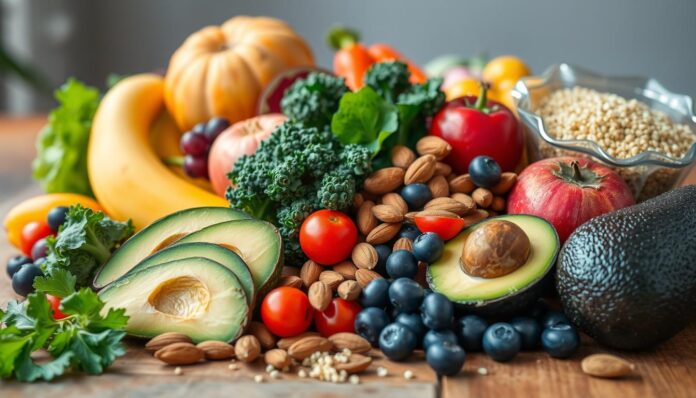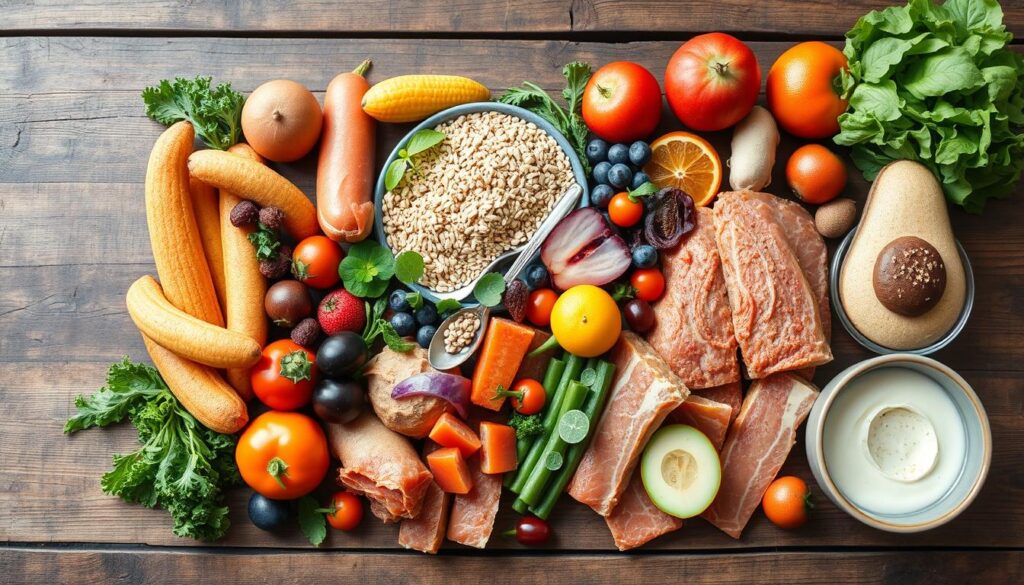How can eating nutrient-rich foods change your life? Discover a balanced diet that boosts longevity and energy. Learn how healthy eating can lead to a better life.
A balanced diet is full of benefits for adults. It can add years to your life and make your skin, teeth, and eyes healthier. It also strengthens muscles and bones, boosts your immune system, and lowers the risk of heart disease and some cancers.
Eating the right foods helps with healthy pregnancies and breastfeeding. It also supports your digestive system and helps you stay at a healthy weight.
Key Takeaways
- Nutrient-rich foods provide essential vitamins, minerals, and antioxidants for overall wellness.
- A balanced diet supports physical, mental, and emotional well-being.
- Healthy eating can reduce the risk of chronic diseases and promote longevity.
- Incorporating a variety of whole, unprocessed foods is the foundation of a nutritious lifestyle.
- Tailoring your diet to your specific needs and preferences can lead to optimal health benefits.
Understanding the Foundation of Nutritional Wellness
Keeping a balanced diet is key to staying healthy. A good diet includes foods like veggies, fruits, lean proteins, whole grains, and low-fat dairy. These foods give you the carbs, proteins, fats, vitamins, and minerals your body needs to work right.
Key Components of a Balanced Diet
To meet your nutritional needs, focus on these important foods:
- Vegetables and fruits: Eat a variety to get lots of vitamins, minerals, and antioxidants.
- Whole grains: Choose whole-wheat bread, oats, brown rice, and quinoa for fiber and complex carbs.
- Lean proteins: Go for lean meats, poultry, fish, eggs, legumes, and nuts for muscle health.
- Low-fat dairy: Include low-fat milk, yogurt, and cheese for calcium and protein.
Role of Macro and Micronutrients
Macronutrients like carbs, proteins, and fats give you energy and help with body functions. Micronutrients, like vitamins and minerals, are vital for health. They help with immune function and bone strength.
Daily Nutritional Requirements
Your daily nutrient needs change based on age, gender, and how active you are. The Dietary Guidelines for Americans 2020-2025 offer specific advice. By reading labels and choosing wisely, you can meet your body’s needs.
“A balanced diet is the foundation of good health. By incorporating a variety of nutrient-dense foods, you can nourish your body and support your overall well-being.”
Benefits of Healthy Eating for Physical Health
Eating well is key for your body’s health. Foods rich in nutrients can lower disease risks, strengthen muscles and bones, and boost your immune system. A diet full of fruits, veggies, whole grains, and lean proteins offers many health perks.
Healthy eating can help prevent heart disease, stroke, type 2 diabetes, and some cancers. Nutrient-dense foods protect your body and keep it working well. They also help with weight control, preventing obesity-related issues.
As you get older, keeping muscles and bones strong is vital. A diet with enough protein, calcium, and vitamin D can help. It prevents muscle loss and strengthens bones, reducing osteoporosis and fracture risks. A balanced diet also boosts your immune system, fighting off infections and illnesses better.
| Nutrient | Health Benefits |
|---|---|
| Protein | Supports muscle growth and maintenance, aids in wound healing, and helps regulate immune function. |
| Calcium | Promotes bone health and strength, reducing the risk of osteoporosis and fractures. |
| Vitamin D | Enhances calcium absorption, supports bone health, and may help regulate immune function. |
| Antioxidants | Protect cells from damage, reduce inflammation, and may lower the risk of chronic diseases. |
Focus on physical health with a balanced, nutrient-rich diet. This proactive approach can help keep you well and lower disease risks. Adopting healthy eating habits is a powerful way to maintain your physical health.
Heart Health and Disease Prevention
Your diet is key to a healthy heart. Smart food choices can lower your risk of heart disease. Let’s look at how nutrition can protect your heart.
Reducing Cardiovascular Risks
Eating a heart-healthy diet means lots of vegetables, fruits, whole grains, and lean proteins. These foods help manage blood pressure and cholesterol levels.
- Eat more fiber-rich foods like oats, beans, and berries. They can improve your cholesterol and heart disease risk.
- Reduce saturated and trans fats from fried foods, processed snacks, and high-fat dairy. They can harm your cholesterol.
- Choose heart-healthy fats in avocados, nuts, and olive oil. They can lower bad cholesterol and raise good cholesterol.
Blood Pressure Management
Keeping blood pressure healthy is vital. The DASH diet is a good choice. It focuses on low-fat dairy, whole grains, and lots of fruits and vegetables.
To control blood pressure:
- Keep sodium intake under 2,300 milligrams daily. Aim for less than 1,500 milligrams if your blood pressure is high.
- Eat more potassium-rich foods like bananas, sweet potatoes, and leafy greens. Potassium can balance sodium’s effects.
- Do regular physical activity. Exercise can lower blood pressure and boost heart health.
Cholesterol Control Through Diet
Healthy cholesterol levels are essential for your heart. Smart diet choices can manage your cholesterol and heart disease risk.
Include these in your diet:
- Soluble fiber from oats, beans, and lentils can lower bad cholesterol.
- Plant-based proteins like nuts, seeds, and legumes can raise good cholesterol.
- Healthy fats in avocados, olive oil, and fatty fish can improve your cholesterol.
By choosing heart-healthy foods, you can lower your heart disease risk. This helps manage blood pressure and cholesterol. It’s key for a strong heart.
Weight Management and Metabolic Health
Keeping a healthy weight is key for your overall health. Too much weight can raise the risk of serious diseases like heart disease and diabetes. A balanced diet and regular exercise can help you stay at a healthy weight and keep your metabolism working well.
To manage your weight, eat more nutrient-rich, lower-calorie foods. Foods like veggies, fruits, and beans have fewer calories than processed foods. Eating a balanced diet and watching your portion sizes helps you stay within your calorie needs while getting the nutrients you need.
Regular exercise is also vital for your metabolic health. Aim for at least 150 minutes of moderate exercise and muscle-strengthening activities each week. This can improve how your body handles insulin and blood sugar, helping you maintain weight and lower health risks.
“Achieving and maintaining a healthy body weight can lead to significant improvements in metabolic markers such as blood sugar levels, insulin sensitivity, lipid profiles, and blood pressure.”
Weight management is a long-term journey, not a quick fix. It takes consistency, patience, and a whole-body approach to healthy eating and exercise. By focusing on your overall wellness, you can enjoy the benefits of a healthy weight and a strong metabolism.
Boosting Immune System Function
Keeping your immune system healthy is key to feeling good. Eating foods that boost your immune system helps your body fight off sickness. You can use many strategies, like eating foods high in antioxidants and following the seasons.
Foods That Enhance Immunity
Some nutrients are super important for your immune system. Vitamin C in citrus fruits and greens is a big help. Zinc, selenium, iron, and protein also play big roles in keeping your immune cells strong.
Antioxidants and Their Role
Eating foods high in antioxidants can help fight off free radicals. Free radicals are bad guys that can cause chronic diseases. Foods like leafy greens and berries are full of antioxidants. While studies on antioxidants are ongoing, they show promise in fighting free radicals.
Seasonal Eating for Immunity
Eating foods in season means you get a variety of nutrients all year. It also helps you get the most vitamins and minerals when they’re at their peak. This supports your immune system all year long.
| Nutrient | Recommended Daily Amount | Food Sources |
|---|---|---|
| Vitamin C | 75 mg for women, 90 mg for men | Citrus fruits, bell peppers, broccoli, strawberries |
| Vitamin E | 15 mg | Almonds, sunflower seeds, spinach, avocado |
| Selenium | 55 mcg | Brazil nuts, tuna, beef, eggs |
| Zinc | 11 mg for men, 8 mg for women | Oysters, beef, chickpeas, pumpkin seeds |
By eating foods that boost your immune system, you can keep your body healthy. Focus on foods high in antioxidants and eat seasonally. This will help you stay healthy all year.
Mental Health and Cognitive Benefits
Eating well can greatly improve your mental health and brain function. A diet full of nutrients can make you feel happier and more focused. Adding the right foods to your diet can help your mental health and cognitive function.
Carbs like brown rice and sweet potatoes can boost serotonin levels. This helps keep your mood stable and boosts happiness. On the other hand, eating too much processed food can lead to depression and anxiety. Eating whole, nutrient-dense foods can lower the risk of mental health problems and improve focus.
Drinking enough water is also key. Even a little dehydration can affect your mood and energy. Foods rich in omega-3s, like fish and nuts, are great for your brain health. Adding protein to meals can also help keep your mood stable.
| Key Nutrients for Mental Health | Benefits |
|---|---|
| Vitamin D | Supports mood and cognitive function |
| Omega-3 Fatty Acids | Promote brain health and reduce inflammation |
| Probiotics | Improve gut health, which is vital for overall wellness |
Eating foods that are good for your gut is also important. Fruits, veggies, beans, and probiotics like yogurt are key. Mindful eating can also improve your health and how you feel about food.
“In a study assessing the effect of a Mediterranean diet in treating moderate to severe depression among males aged 18 to 25, the diet intervention group showed significant improvements in depressive symptoms, with a mean reduction of 20.6 points on the Beck Depression Inventory Scale—Version II, compared to a reduction of 6.2 points for the control group.”
By choosing the right foods, you can improve your nutrition, mental health, and cognitive function. Making smart food choices can help you feel better and live a fuller life.
Digestive Health and Gut Wellness
Keeping your digestive system healthy is key to feeling good. The gut microbiome, a mix of tiny living things in your gut, is important for digestion, absorbing nutrients, and fighting off sickness. Knowing about dietary fiber, probiotics, and how to handle digestive problems can help you care for your gut wellness.
Importance of Dietary Fiber
Dietary fiber is a must-have in your diet. It helps keep your bowels regular, lowers inflammation, and helps good bacteria grow. Most Americans don’t get enough fiber, which is 20-30 grams a day. Eating more fibrous foods like veggies, fruits, beans, and whole grains can boost your digestive health.
Probiotics and Gut Health
Probiotics are live helpers for your gut microbiome. They aid in digestion, making vitamins, and boosting your immune system. While more research is needed, adding probiotic-rich foods like yogurt, kefir, and fermented veggies to your diet can be good for you.
Managing Digestive Issues
Problems like irritable bowel syndrome (IBS), inflammatory bowel disease (IBD), and food intolerances can really hurt your life quality. Finding and fixing the root causes of these issues, through diet changes, managing stress, and sometimes medical help, can ease your discomfort and improve your digestive health.
By focusing on a diet rich in fiber, adding probiotics, and tackling digestive problems, you can actively support your gut wellness and overall health.
Energy Levels and Physical Performance
To fuel your body and boost physical performance, a balanced diet is key. Eating foods rich in nutrients is essential. Whole grains give you a steady energy boost. Lean proteins help your muscles work and recover well. Drinking enough water and eating lots of fruits and veggies ensures you get all the nutrients you need for top physical performance.
Experts say athletes should get half their calories from carbs for best results. Eating carbs like fruit juice, yogurt, or an English muffin with jelly before a workout gives you quick energy. During long, hard workouts, drinking sports drinks, eating pretzels, or snacking on low-fat granola helps keep your energy up.
Staying hydrated is also vital for athletes. Drink 16 ounces of water 2 hours before working out and keep sipping every 15 to 20 minutes during and after. Replacing lost body weight with water within 6 hours helps keep you hydrated.
| Nutrient | Recommended Intake for Athletes | Benefits |
|---|---|---|
| Carbohydrates | 50% of daily caloric intake | Fuel high-intensity exercise |
| Protein | 1.2 to 2.3 grams per kilogram of body weight per day | Support muscle function and recovery |
| Fluids | 16 oz. before workout, 15-20 oz. during and after | Maintain hydration and body temperature |
By eating a diet full of nutrient-rich foods, athletes can improve their energy and physical performance. The right mix of carbs, proteins, and fluids fuels your body and helps you reach your athletic goals.
Building Strong Bones and Muscles
Keeping your bones and muscles strong is key to staying healthy. Eating foods full of nutrients helps a lot. We’ll look at foods rich in calcium and protein to keep your bones and muscles strong.
Calcium-Rich Food Sources
Calcium is vital for strong bones and teeth. Make sure to eat foods high in calcium. Here are some good options:
- Dairy products like milk, yogurt, and cheese
- Dark leafy greens such as kale, broccoli, and spinach
- Canned fish with bones, like salmon and sardines
- Fortified plant-based milk alternatives and juices
- Tofu and other soy-based foods
Protein Requirements for Muscle Health
Protein is important for muscle strength. Eat a variety of protein-rich foods. Here are some good choices:
- Lean meats, poultry, and fish
- Eggs and Greek yogurt
- Nuts, seeds, and nut butters
- Legumes, lentils, and beans
Vitamin D and Bone Strength
Vitamin D helps your body use calcium better. It’s good for bones. Here are some vitamin D sources:
- Sunlight exposure (the body can synthesize vitamin D naturally)
- Fatty fish like salmon, tuna, and mackerel
- Egg yolks
- Fortified dairy products and plant-based milk alternatives
Eating foods rich in calcium, protein, and vitamin D helps keep your bones and muscles strong. This supports your overall health and well-being.
| Nutrient | Recommended Daily Intake | Top Food Sources |
|---|---|---|
| Calcium | 1,000-1,200 mg | Dairy products, leafy greens, canned fish, fortified foods |
| Protein | 46 g (women), 56 g (men) | Lean meats, poultry, fish, eggs, dairy, legumes, nuts |
| Vitamin D | 200-600 IU | Sunlight, fatty fish, egg yolks, fortified foods |
A balanced diet with calcium, protein, and vitamin D, plus exercise, keeps your bones and muscles strong. This is key for a healthy life.
Longevity and Quality of Life
Eating healthy can make you live longer and improve your life quality. A diet full of fruits, veggies, whole grains, and healthy fats helps prevent diseases. It also keeps your mind sharp and body strong as you get older. The Mediterranean diet is known for its health benefits, including longer life and less disease.
Following a plant-based diet can lower your risk of dying from any cause, obesity, diabetes, and heart disease. It also cuts the risk of metabolic syndrome and type 2 diabetes by half. Plus, it can reduce heart disease events by up to 40%. Eating foods rich in flavonoids can even lower dementia risk by 20%.
Healthy eating and exercise can lead to a more active and happy life later on. Studies show eating well can reduce early death risk by 20%. It also lowers total mortality by 20% across all races and ethnicities. Eating healthy is linked to less heart disease and cancer deaths.
FAQ
What are the benefits of healthy eating for adults?
Healthy eating can add years to your life. It makes your skin, teeth, and eyes healthier. It also strengthens your muscles and bones.
It boosts your immunity and lowers the risk of heart disease and some cancers. It supports healthy pregnancies and breastfeeding. It also helps keep your digestive system working well and helps you maintain a healthy weight.
What is a balanced diet?
A balanced diet includes vegetables, fruits, lean proteins, whole grains, and low-fat dairy. These foods give you the vitamins and minerals you need. They provide energy and support your body’s functions.
How do the Dietary Guidelines for Americans 2020-2025 help guide healthy eating?
The Dietary Guidelines for Americans 2020-2025 offer advice on what nutrients you should eat. Reading Nutrition Facts labels helps you pick foods that are good for you. Look for foods high in fiber, vitamins, and minerals, and low in sodium, added sugars, and unhealthy fats.
How does healthy eating contribute to physical health?
Healthy eating helps prevent chronic diseases. It helps you maintain a healthy weight and strengthens your muscles and bones. It also boosts your immune system.
Eating foods like fruits, vegetables, whole grains, and lean proteins can lower your risk of heart disease, stroke, type 2 diabetes, and certain cancers.
What is the DASH diet, and how does it support heart health?
The DASH diet is good for your heart. It focuses on vegetables, fruits, whole grains, low-fat dairy, and lean proteins. It limits foods high in saturated and trans fats, added sugars, and sodium.
Eating foods high in fiber can improve your blood cholesterol and lower your risk of heart disease. Reducing salt intake can help control your blood pressure.
How can healthy eating support weight management?
Eating healthily can help you maintain a moderate weight. This reduces your risk of chronic health issues like heart disease, type 2 diabetes, and certain cancers. A diet rich in fiber and lean proteins can help you lose weight without counting calories too much.
Vegetables, fruits, and beans are generally lower in calories than processed foods.
How do antioxidants in fruits and vegetables support immune function?
Antioxidants in fruits and vegetables can help remove harmful free radicals. This may reduce your risk of cancer. Phytochemicals in plant-based foods act as antioxidants, including beta carotene, lycopene, and vitamins A, C, and E.
Eating seasonal foods ensures you get a variety of nutrients all year. This supports your immune system.
Can healthy eating improve mental health and cognitive function?
Yes, a healthy diet may improve your mood and reduce symptoms of depression and fatigue. Diets low in glycemic load, rich in vegetables, whole fruits, and whole grains, can positively affect your mental health.
Nutrients like vitamin D, C, and E, omega-3 fatty acids, flavonoids, and polyphenols are good for your brain.
How does dietary fiber support digestive health?
A diet high in fiber can reduce inflammation in your gut and improve your digestive health. Foods like vegetables, fruits, legumes, and whole grains provide prebiotics and probiotics that support good gut bacteria.
A healthy gut microbiome helps fight harmful bacteria and viruses. This supports your immune function and digestive wellness.
How can healthy eating boost energy levels and physical performance?
Eating a balanced diet rich in nutrient-dense foods can boost your energy levels and improve your physical performance. Complex carbohydrates from whole grains provide sustained energy, while lean proteins support muscle function and recovery.
Drinking enough water and eating foods high in fruits and vegetables ensures you get the nutrients you need for energy production.
What nutrients are essential for strong bones and teeth?
Calcium and magnesium are key for strong bones and teeth. Foods high in calcium include dairy, kale, broccoli, and canned fish with bones. Magnesium is found in leafy greens, nuts, seeds, and whole grains.
Adequate protein intake supports muscle health and strength. Vitamin D, obtained through sunlight and certain foods, is essential for calcium absorption and bone strength.
How does healthy eating contribute to longevity and quality of life?
Healthy eating habits contribute to a longer life and better quality of life. A balanced diet can prevent chronic diseases, maintain cognitive function, and support physical and mental well-being as you age.
The Mediterranean diet, rich in fruits, vegetables, whole grains, and healthy fats, is associated with increased longevity.






